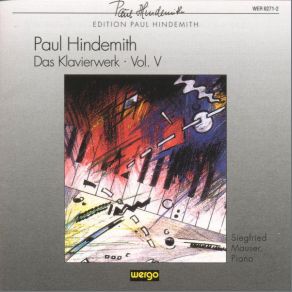Paul Hindemith: Das Klavierwerk - Vol.5
Download links and information about Paul Hindemith: Das Klavierwerk - Vol.5 by Mauser Siegfried. This album was released in 1994 and it belongs to New Age genres. It contains 21 tracks with total duration of 57:52 minutes.

|
|
|---|---|
| Artist: | Mauser Siegfried |
| Release date: | 1994 |
| Genre: | New Age |
| Tracks: | 21 |
| Duration: | 57:52 |
| Buy it NOW at: | |
| Buy on iTunes $9.99 | |
Tracks
[Edit]| No. | Title | Length |
|---|---|---|
| 1. | Tanzstücke Op.19: Mässig schnell. Etwas unbeholfen vorzutragen | 2:36 |
| 2. | Tanzstücke Op.19: 2. Sehr lebhaft | 1:30 |
| 3. | Tanzstücke Op.19: 3. Mässig schnell (Twostep) | 3:48 |
| 4. | Tanzstücke Op.19: 4. Pantomime: Einleitung-Mässig Einleitung-MässigSchnell-Langsamer-Sehr Einleitung-MässigSchnell-Langsamer-SehrLebhaft-Schnell | 6:05 |
| 5. | Tanzstücke Op.19: 5. Sehr lebhaft | 1:29 |
| 6. | Klaviermusik Op.37, 1.Teil: 1. Schnelle Viertel, durchaus sehr markiert zu spielen | 4:47 |
| 7. | Klaviermusik Op.37, 1.Teil: 2. Langsame Viertel - Prestissimo | 5:55 |
| 8. | Klaviermusik Op.37, 1.Teil: 3. Rondo. Äusserst lebhaft | 3:13 |
| 9. | Klaviermusik Op.37, 2.Teil: 1. Einleitung und Lied | 5:50 |
| 10. | Klaviermusik Op.37, 2.Teil: 2. Lebhaft | 0:55 |
| 11. | Klaviermusik Op.37, 2.Teil: 3. Leicht bewegte ganze Takte | 1:08 |
| 12. | Klaviermusik Op.37, 2.Teil: 4. Langsam, ein wenig Rubato | 2:56 |
| 13. | Klaviermusik Op.37, 2.Teil: 5. Äusserst lebhaft | 1:30 |
| 14. | Klaviermusik Op.37, 2.Teil: 6. Ziemlich lebhafte Achtel | 1:55 |
| 15. | Klaviermusik Op.37, 2.Teil: 7. Ziemlich lebhafte Viertel | 1:01 |
| 16. | Klaviermusik Op.37, 2.Teil: 8. Trio 1 - Ruhig bewegte Achtel | 3:37 |
| 17. | Klaviermusik Op.37, 2.Teil: 9. Trio 2 - Ziemlich schnell | 2:06 |
| 18. | Klaviermusik Op.37, 2.Teil: 10. Trio 3 - Mässig schnelle Halbe | 2:04 |
| 19. | Klaviermusik Op.37, 2.Teil: 11. Langsam und zart | 2:45 |
| 20. | Klaviermusik Op.37, 2.Teil: 12. Lustig, mässig schnell | 0:57 |
| 21. | Klaviermusik Op.37, 2.Teil: 13. Lebhaft, frisch | 1:45 |
Details
[Edit]Paul Hindemith's final work for solo piano, 1942's Ludus Tonalis (Studies in Counterpoint, Tonal Organisation and Piano Playing), was composed two years after the German composer's wartime exile in America, and was apparently, at least in part, intended as a response to the jingoistic spirit with which Dimitri Shostakovich's Leningrad symphony had been received upon its American premiere. Though Hindemith was far from a Nazi supporter, having been branded a "cultural Bolshevik" by Hitler's government, he was stung by the way in which the war had made all German composers, regardless of their sympathies, immediately suspect. The intentionally dry subtitle of the work invokes a didactic spirit, as if Hindemith is exhibiting for the world what he, a German composer, can show the American and Russian composers who were currently overshadowing him thanks to geo-political forces far removed from the concerns of art. This 1993 recording by Siegfried Mauser, the final volume in a complete set of Hindemith's works for solo piano, finds the pianist playing in a warm, loose style that softens the sense of stiff formal consistency at the heart of this mostly theoretical work. Mauser has taken the time to tease out the melodies in these three-part fugues, imbuing them with something close to the playful spirit of Aldo Ciccolini's recordings of Erik Satie's whimsical piano works. Ludus Tonalis remains a challenging listen, but at least in this recording, not a difficult one.